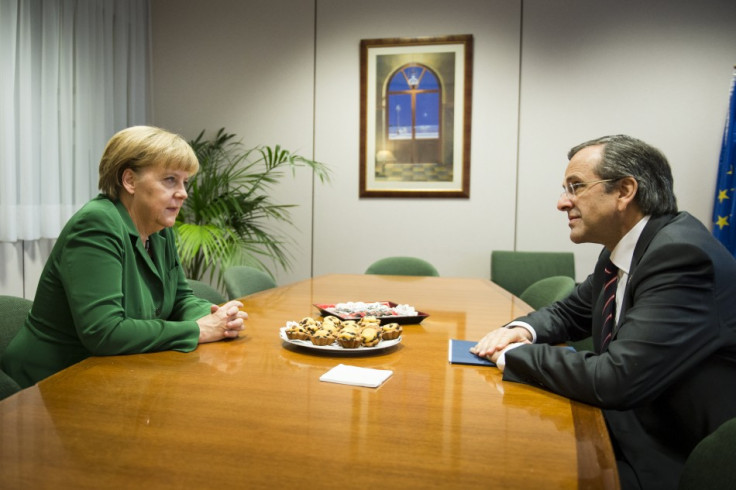Germany Says Not Ready to Release Greek Aid Tranche as Default Concerns Grow

Germany won't sign-off on multi-billion euro aid tranche for Greece without parliamentary approval, a government official said Friday, causing concern the delay could push Greece into a short-term default as early as next week.
Marianne Kothe, the spokeswoman for Germany's Finance Ministry, told reporters in Berlin that lawmakers could not make a decision on releasing the €31.5 aid tranche until Greece's international creditors, the so-called "Troika" of the International Monetary Fund, the European Central Bank and the European Union, published its long-delayed report on the state of the nation's budget and finances and its efforts in keeping to agreements reached in two previous bailouts.
Finance Ministry officials in Greece, meanwhile, told Reuters they were "examining the rollover of €5bn in treasury bills" that mature on 16 November because they do not have the cash to repay investors and doesn't expect the Troika release, which was originally due in late June, to be approved by that time.
And EU spokesperson said earlier today that area finance ministers, meeting in Brussels on Monday, were unlikely to reach an agreement on releasing the tranche but insisted there would be no "accidental or otherwise" default of the $5bn in Greek bills the following day.
The bills are thought to have been largely sold to domestic Greek banks in late August before being quickly deposited at the central Bank of Greece in exchange for longer-term loans.
Germany had earlier praised the Greek government for its "courage" after its Prime Minister, Antonis Samaras, won approval for around €13.5bn worth of spending cuts, tax increases and labour market.
"The Greek government has taken a very impressive step... It approved a very comprehensive set of measures, including many important structural reforms. These will help Greece on its way to winning back competitiveness and trust," said government spokesman Steffen Seibert "It is a still a long path... but the Greek government is showing determination and courage."
Samaras had hoped the reforms were enough to unfreeze new funding, but concerns persist over the longer-term health of Greece's collapsing economy and its ability to pay billions it will owe even after the biggest private debt restricting in history.
The issue of Greece's short-term funding has been clouded by concerns that he nation won't meet debt sustainability targets agreed under the terms of its current bailout.
The European Commission's projections for Greece's debt, released earlier this week, suggest it will rise to around 190 percent of its GDP by 2014, making the long-term goal of reducing that figure to below 120 percent by 2020 nearly impossible to reach. The EC expects Greece's economy to continue to contract in 2013, by as much as 4.2 percent, before advancing modestly in 2014, when it assumes it primary budget deficit (which excludes debt servicing costs) will fall to 4.5 percent of GDP.
The IMF is can't, under its established rules, release its €1.6bn portion of the tranche unless there's a deal in place that would significantly improve these figures. The Fund would like some form of "haircut", or partial debt forgiveness, from the so-called official sector (the ECB, various governments, etc.) but EU Economic and Monetary Affairs Commissioner Olli Rehn, and virtually every other senior politician or policy maker in Europe, has rejected that suggestion outright.
Assuming a rollover of the bills can be orchestrated by Athens, the German delays may increase speculation that Chancellor Angela Merkel is attempting to steer rescues for Greece, Spain and Cyprus into a "triple-bailout" request she can bring to the Bundestag before the end of the year.
Spain bought more time for its own grim financial state Thursday with the sale of €4.8bn in medium and long-term debt that concludes its funding needs until at least January. With regional elections looming in Catalonia that could raise the constitutional spectre or succession for Spain's biggest and richest region, Prime Minister Mariano Rajoy has been desperately fighitng back pressure from all sides to seek formal financial assistance from his EU partners.
However, Reuters first reported last month that senior Eurozone officials were concerned that Germany was applying pressure on Spain to delay its bailout request in order to avoid Merkel from having to bring three successive aid packages to the Bundestag.
Political analysts say Merkel and her team were rattled by news that former German Finance Minister Peer Steinbrueck will lead the challenge to unseat her in next year's general election. Steinbrueck's selection as leader immediately narrowed the gap between his Social Democratic party and Merkel's ruling Christian Democrats by three percentage points, according the polling group Forsa, and to its highest overall rating in at least six years.
Merkel's standing at home was also diminished by the hostile - and at times repellent - reception the Chancellor received during her first visit to Greece since the sovereign debt crisis began. German media made much of the chaotic scenes around Athens, which included some demonstrators clad in Nazi paraphernalia, and criticised her vow to keep Greece within the single currency. "Germany does not deserve this" shouted a headline the following day in Bild, Germany's most-read newspaper.
Her parliamentary task in obtaining approval for further European rescue efforts was also made more difficult last month with the ruling from the nation's Constitutional Court on Germany's participation in the region's permanent bailout fund. It effectively capped Germany's financial commitment at €190bn but allowed room for more funding only after a full, detailed consultation with lawmakers.
Market pressure for a solution has, at least for the moment, abated, in large part because of a pledge from the ECB to offer unlimited support in the bond market to help stabilize borrowing costs for debt-laden Eurozone members - provided they apply for formal EU assistance.
© Copyright IBTimes 2025. All rights reserved.





















